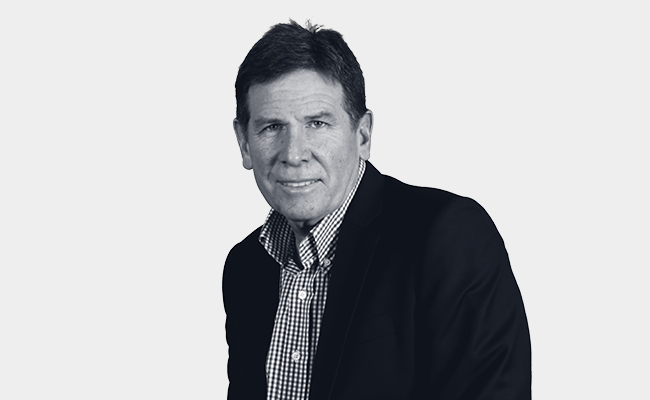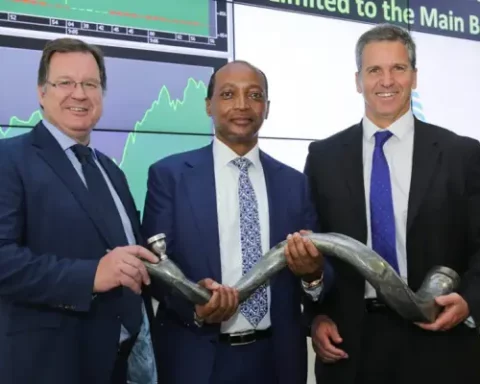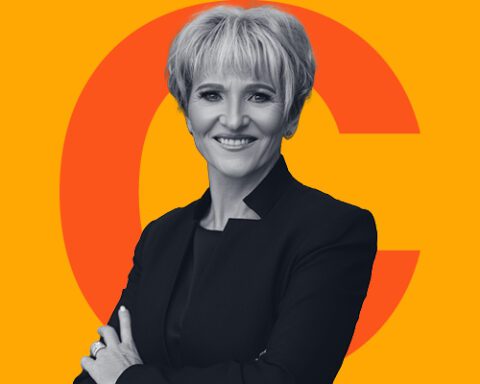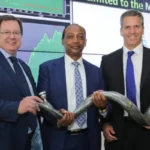Bidcorp – the mighty food services business that’s probably behind most of your restaurant meals – has parlayed a 3.6% rise in first-half revenue to end-December (of R117.9bn) into a 6.8% increase in trading profit, to R6.26bn. But headline earnings per share fell 2%, partly on a R450m writedown after the decision to exit its German business. Currency spoke to CFO David Cleasby about the results.

Emerging markets – where South Africa sits – did really well in terms of the ratio of profit to sales, and South Africa did especially well. I was surprised, but is that just me being a South Africa pessimist?
I think generally the market is a little bit better and that’s obviously got to do with the politics of the past six to nine months. There’s slightly better sentiment out there, but this isn’t a one-off. You’ve got to go back a few periods and see there’s been almost 20% growth period after period.
Our main businesses in South Africa are similar to the food distribution business and the other part of it is Crown Food Group, which is mostly an ingredients business. We’ve seen a big improvement in the Crown side – both from a top-line perspective as well as [in] margins. So part of it is our management doing a much better job; it continues to grow in a market that has seen some pressure on patrons in particular.
CEO Bernard Berson was asked in the presentation about what’s happening in China – the question being why nothing seems to have come of all the stimulus of late. Obviously you can’t answer that, but is the lack of excitement sufficiently worrying that you might be pulling back on expanding there?
We’re certainly not holding back on expansion and I think you have to trade through it. We have had a new management team in place for two years; they’ve stabilised the business and the reality is that the macro environment is poor, but it’s also given us the opportunity to relook at what we’re doing. We were essentially importing mostly European product into China and we’re trying to mix that up a bit [as well as] the markets that we serve. So it’s given us an opportunity, I guess with the slowdown, to be able to reposition the business, and we’ve had a look at some of the costs. I guess if it continues for a sustained period it is a concern but I’m not sure that will be the ultimate game. I think they have to see some consumer spend come back and I’m sure they will at a point in time.
How big is China within Bidcorp?
It’s probably 3% of the group, so it’s not a big component. It was slightly bigger going back a few years.
In the results you talk about ‘balance sheet conservatism’ being a ‘competitive advantage’. Why do you have that explicitly in your presentation? Do you come under pressure from analysts to take on more debt and gear up the business?
We’ve always been conservative and it certainly gives me a lot of comfort, but particularly when you go through something like Covid – we didn’t have to rely on anyone, we were able to work through it and the hospitality market was particularly hard hit. So it’s just something we have done and will continue to do.
There’s a fair balance between returns to shareholders via dividends and reinvesting in the business. We’ve managed to do both and we’ve managed to also keep the debt down because the businesses are pretty cash generative. Yes, people would like some gearing, but there are many examples where that’s gone out of control – look at Spar. Too much dividends and look where it got them.
We run the business the best way we see fit and ultimately for me the key thing is, what are your returns? Gearing can improve them a little, depending on how much you take on, but the reality is that you have to look at the overall return and we think ours is as good as, or superior to, our peers.
You know, it also gives us the firepower to be able to make an acquisition if something comes along; you can turn it around very quickly without having to rely on going to the banks and begging for permission. It’s quite a competitive issue, so it gives us the ability to transact very quickly.
I’m always somewhat surprised that there can be such pressure from investors to gear up …
I think if you look at the really long-only investors, they’re absolutely happy with a conservative balance sheet. If you look at the short-term investors, they’re the ones who advocate a whole lot of debt because potentially when the company gets into trouble they’re no longer around. It’s great when it goes with you, but it can turn against you pretty quickly.
You mentioned in the results that the big investments this half have been in real estate – and that’s going to knock profits a bit. Why is this investment important for you at this point?
At least half of our capital expenditure in this period was into long-term warehousing. We lease facilities generally for anything from 20 to 40 years depending on their useful life; they are specialist because we have to put freezers in them and that comes at enormous cost and a landlord isn’t necessarily going to want to do that for you. So we have the ability and wherewithal to do most of these investments ourselves.
We think it’s a competitive advantage and we’re not beholden to someone else to tell us, well you either have to take another 10-year lease or you’re out. We can decide on when we exit these properties, and the cost of building versus the cost of paying a landlord is generally far better because we’ve got a covenant. A purist will tell you that detracts from returns and you shouldn’t be doing that. Well, I’d argue that, yes, it does in theory, but the reality is that it gives us a competitive advantage to deal with these properties as we see fit, and if you look at Bidcorp the returns are not substandard. We own about 72% of our properties so it’s a big investment, but it serves us well.
How much did you actually spend on the period on properties?
About R1.6bn.
Analysts also wanted to know about your progress in South America – where you have operations in Brazil and Chile and Argentina. How long have you been there and how long will it take before you starting really flexing yourselves?
If you take South America, we’ve probably been there 10 years, so it doesn’t happen overnight. You do bolt-ons, you consolidate the market and before long [10 to 15 years] you’ve woken up and you’ve got a national footprint. We’ve got there in Chile, and it’s come at a bit of a cost because we probably had done it too aggressively, but we’ve got a national footprint [now].
In Brazil we’re predominantly around the Sao Paolo region; we have had the opportunities to scale it up in other places like Rio but we just haven’t wanted to pay the cost of these acquisitions. Brazil’s run at pretty high multiples on these small acquisitions; where we would typically pay between eight and 10 times earnings, they’ve been in excess of 10. We could have overspent but I think in the long term that catches up with you. So it’s been frustrating but we think we’ll get there.
We’ve been in Australia for the better part of 30 years and it took 15 years before we started to get real traction and scale.
Is 10 times earnings sort of the maximum of what you’d pay for another company?
We talk about six to eight times for a bolt-on. I think if you’re looking at a new geography you’re not going to get away with that pricing because you’re paying for a much bigger platform: you want to buy a number one, two or three business in a particular market. So on a new acquisition it could be anywhere up to 11 times.
Do you have anything in America yet?
No.
Are you at all tempted to go there?
Well, certainly not at the moment. It’s got some complications. First, the pricing is much higher than you find in other parts of the world; it’s a very competitive market. A lot of people get seduced by the size of the market, but you’ve got some big players and they’ve spent the past 30 to 40 years consolidating that market.
So there are some big headwinds, and ultimately our view is, where are we going to get a better return? Putting a dollar into the US, or into maybe Brazil or some other geography where we have a much better chance of consolidating and we just think that’s the better option. One of the reasons we got out of Germany was because the cost of us getting to scale was going to be prohibitive and it’s an opportunity cost: do you spend it there or in a place like Spain which is far less consolidated – and cheaper.
Sign up to Currency’s weekly newsletters to receive your own bulletin of weekday news and weekend treats. Register here.









